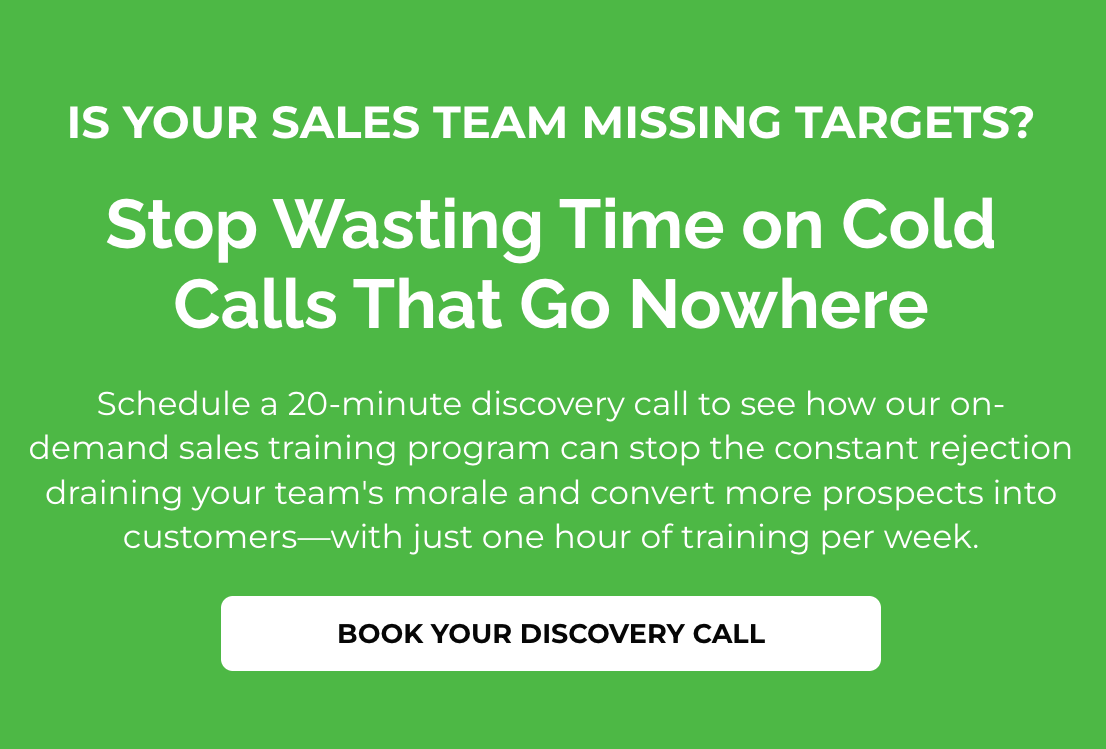What Sales Questions Should Be Asked On the Phone

What Sales Questions Should Be Asked On the Phone
I once witnessed high school students compete in a mock trial competition, battling it out in a courtroom with actual judges, with each team having to take turns being the prosecution and the defense.
During one of the mock trials, a student in the “prosecution role” became visibly frustrated when he wasn’t getting the answers he needed out of a defense witness, no matter how many times he re-asked the question.
When the trial was over, the judge addressed each student and gave them constructive criticism.
His advice to the prosecution attorney/student:
“If you don’t like the answer, maybe your question was the problem!”
How true is that!?! Not only for attorneys but salespeople as well.
As I watched this situation play out in the courtroom, I could easily see how this same scenario happens every day with salespeople and their prospects.
A salesperson gets a prospect on the phone, randomly picks a few questions to ask, prospect’s answers are short, guarded, ends up asking “how much is this?” (and not the “buying signal” kind of question – no, not that one. This one is the “get me out of this call” question.
Both parties soon get frustrated, and the call ends with the sales rep saying they will send over some information followed by:
“How about I follow up with you next week? Is Tuesday or Thursday better for you?”
And to no one’s surprise, the prospect is a no show.
This happens every day in every industry.
BTW, I should point out that this is why companies do not need “industry” specific sales training. The problem isn’t “product knowledge.” The problem is there’s a primary “sales knowledge” gap.
Phone sales reps worldwide are making calls to prospects with no game plan or strategy other than to be a “Captain Wing-It” and hope for the best.
And when the economy is booming, companies can get away with that strategy for the most part.
But when the low-hanging fruit is dried up, companies can’t afford to have order takers disguised as sales reps, making outbound calls OR handling the few warm leads that may trickle in.
It would be best if you had sales tacticians who are well prepared to handle the sales call from A to Z over the phone.
If you’re not sure if you have a sales group of tacticians, in your next sales meeting, ask the team one question:
“What is the purpose/goal of your first sales call to a prospect?”
If you have a team of 10 reps and you get four different answers, you have a problem. (If you want to know the correct answer, watch this short video)
The same drill could be used in another scenario:
What is the first sales question you should ask once you get a prospect past the OVS (Opening Value Statement),
You realize that once you get a prospect on the phone and complete your opener (OVS), you have to start the conversation by asking a sales question – you know this, right??
Look at it this way:
When you are about to make a sales call, it’s like you’re in the batter’s box.
Your objective is to get on base.
If you have a successful opener, that means you are now on 1st base. The only way to get to 2nd base is to ask the right questions that engage your prospect further into the conversation.
3rd base is where you are giving a presentation to a qualified prospect.
You won’t know if they are FULLY qualified unless you ask them some questions.
TIME OUT:
If you just said, “I already know my prospect is qualified before I call them,” you do not know the meaning of a qualified sales prospect. So let me help you here.
What’s a Qualified Sales Prospect?
A fully qualified sales prospect is a prospect that:
- Has a problem that you can help solve, and they want help solving it (Note, when cold-calling, they most likely don’t realize they have a problem – and you can’t call them a tell them they have a problem because they will doubt it. So you have to ask the right questions that, based on their answers, uncover if a problem exists or not)
- Is the purse-string decision-maker or at the very least influences the decision-maker(s)
- They can afford your solution to their problem should they decide they want it.
You need ALL THREE of these things to be TRUE to have a qualified sales opportunity.
How many deals will you close if they are missing just one of those “checkboxes”?
The answer is ZERO.
Now, your company process may have leads that get marked as SQLs (Sales Qualified Leads)
Some companies use this term to identify leads that match specific criteria to trigger a sales call.
But a prospect can never be a sales-qualified opportunity if they miss one or more of the three “checkboxes” I outlined above.
And the only way you will find out if your prospect is a qualified opportunity is to ask the right sales questions, in the proper order, in the right way/tone, and by listening to the prospect’s responses and appropriately interpreting their answers.
Knowing how to do that means you’re a tactical sales rep, and you will close more sales than those who are not. It’s that simple.
What Sales Questions to Ask?
Here’s a quick outline of the sales question categories that need to be addressed:
- The Engagement Question (this is your first question after the opener)
- Opportunity Size Question
- Pain point(s) Question (Buying Motive)
- Identifying the real Decision-maker(s)
- Timeframe
- Ideal Solution
- Price Point Question
Note: The sales questions categories are universal* – it’s the actual sales questions for each category that will be unique to you and your company/industry. I put the * because occasionally, a question like “opportunity size” is not needed.
Now, how many of you just said, “I can’t ask my prospect all these questions; they will hang up!”
My response is, not only can you ask these questions, but you MUST ask them to do your job to its highest level if you want to close more sales.
The key is you have to know what specific questions to ask, why, and how.
You want to sharpen your sales skills to the point that if your company took away your base salary but increased your commission %, you would not miss a beat (or a mortgage payment).
And the secret to having that type of confidence is knowing what sales questions to ask.
The days of being “Captain Wing It” is over.
Asking better sales questions is essential to becoming a high-powered earner.
– Michael Pedone
Michael Pedone is the CEO/FOUNDER of SalesBuzz.com – On-demand sales courses that teach B2B phone sales techniques that work.

